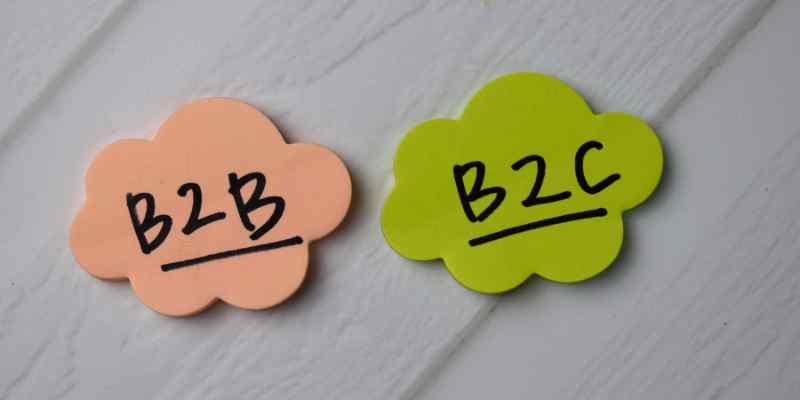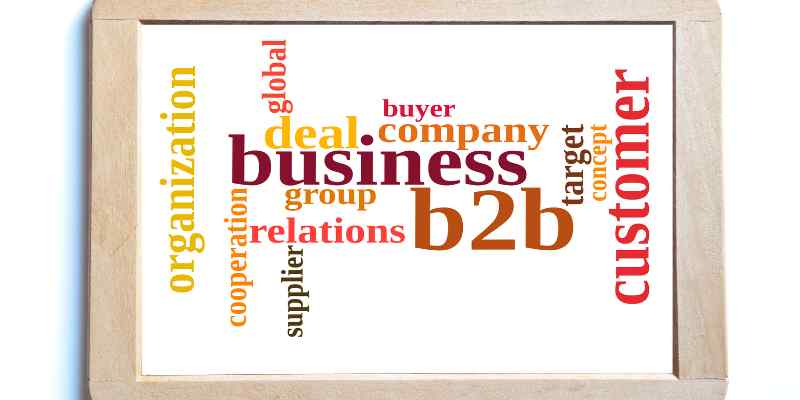Ever noticed the cacophony of messages targeting businesses today? It’s deafening.
Yet, in this noisy world, some companies cut through the chatter, making genuine connections.
How?
While traditional marketing often pushes products or services, this approach feels out of touch in today’s B2B landscape.
Companies want insights, not just information.
They want stories, not just statistics.
They want to partner with brands who understand them, not just vendors selling to them.
Enter B2B content marketing—a strategy that moves beyond mere selling.
It’s about crafting content tailored to address specific business needs and challenges.
B2B content marketing isn’t just about promoting a product; it’s about establishing a relationship by offering genuine value.
In this guide, we’ll explore the nuances of B2B content marketing, underscoring its vital role in building meaningful, lucrative business relationships in today’s digital age.
B2B vs. B2C Content Marketing

While B2C marketing often targets a broad audience with emotional appeals, B2B focuses on a niche segment, offering solutions to specific business problems.
Think of it this way: B2C is the billboard you drive past, while B2B is the detailed whitepaper you read before making a big business decision.
Understanding the Unique Needs of B2B Buyers
B2B buyers aren’t making impulse purchases.
They’re investing in solutions.
A B2C consumer might buy a shoe for its style; a B2B buyer chooses software for its long-term ROI.
This decision often involves multiple stakeholders and a longer buying cycle.
That’s why B2B content must be detailed, informative, and solution-oriented.
Core Objectives of B2B Content Marketing:

Here are some of the core objective of b2b content marketing that helps you to define your direction:
A. Establishing Thought Leadership
Being an expert matters. B2B businesses need to showcase not just what they sell, but the depth of their knowledge.
This means producing content—like in-depth articles and webinars—that positions them as leaders in their field.
Consider, for instance, IBM’s consistent efforts to produce research-rich content about AI, establishing them as a front-runner in the tech world.
B. Lead Generation and Nurturing
Capturing attention is just step one.
B2B content should usher potential clients through the sales funnel, turning casual browsers into loyal customers.
For instance, HubSpot’s extensive library of free templates and tools doesn’t just draw visitors; it converts them into leads.
C. Building and Maintaining Trust
In the B2B realm, trust is currency.
Brands must consistently deliver valuable, accurate, and actionable content.
Case in point: Accenture’s insightful industry reports not only educate but also solidify their reputation as a reliable industry source.
D. Educating Potential Clients About Products/Services
Beyond showcasing benefits, B2B content should elucidate the how and why behind a product.
Cisco, for instance, doesn’t just tell businesses they need a secure network; they educate them on network vulnerabilities, solutions, and best practices through comprehensive guides.
Essential Elements of B2B Content Marketing:

Here are some of the essential elements of B2B content marketing:
A. In-depth Research and Understanding of the Industry
Knowledge is the backbone of B2B content marketing.
Before crafting a single word, it’s crucial to immerse oneself in the intricacies of the industry.
Whether it’s a trending topic, a niche subject, or a looming challenge in the sector, businesses need to be several steps ahead.
Remember Adobe’s CMO.com?
Their deep industry insights made it a go-to resource for marketing professionals.
B. Clear Identification of the Target Audience (Buyer Personas)
Who are you speaking to?
Understanding this is paramount.
By crafting detailed buyer personas – think “IT Ivan” or “Manager Maria” – you can tailor your content to address their specific challenges, questions, and needs.
Mailchimp, for instance, doesn’t just target businesses that need email marketing. They create content for e-commerce businesses, startups, and nonprofits, addressing the unique challenges of each.
C. Consistency in Content Creation and Distribution
It’s not enough to publish a great piece once in a blue moon.
B2B brands need to be consistent, both in terms of quality and frequency.
A steady stream of valuable content not only keeps your brand top-of-mind but also signals reliability.
Look at HubSpot’s blog. Their regular, high-quality posts make them a consistent go-to source for inbound marketing tips.
D. Strong Call-to-Action (CTA) Elements
Every piece of content should have a purpose, whether it’s getting the reader to sign up for a webinar, download a whitepaper, or simply engage with more content.
A compelling CTA isn’t just a button or a line of text; it’s a clear, concise proposition.
Take Slack’s homepage, for example. “Try Slack with your team for free” isn’t just inviting; it promises collaboration and productivity without a price tag.
Types of B2B Content Marketing:
Here are the broad types of content marketing that you can consider for your business:
A. Whitepapers and eBooks
Dig deep into industry insights or offer comprehensive guides on complex topics with whitepapers and eBooks.
These long-form contents showcase expertise and offer value, enticing potential clients to exchange their contact details for knowledge.
Consider Salesforce’s extensive library of eBooks, which covers everything from sales strategies to digital transformation.
B. Case Studies
Want to build trust and showcase tangible results?
Case studies are your best friend.
By presenting real-world examples of how your product or service solved a client’s problem, you provide proof of your claims.
Oracle, for example, regularly showcases client testimonials and detailed case studies, highlighting the efficacy of their solutions.
C. Webinars and Online Courses

Interactive, engaging, and hugely informative, webinars and online courses can establish your brand as an industry thought leader.
It’s not just about showcasing your products; it’s about educating the audience.
HubSpot, known for its inbound marketing expertise, frequently offers webinars, illuminating various facets of digital marketing.
D. Blog Posts and Articles
Regular blog posts and articles not only improve search engine visibility but also provide a platform to address industry trends, challenges, and solutions.
For instance, the Microsoft Business blog consistently dishes out posts, offering insights on everything from remote working to AI.
E. Infographics
In the B2B world, data reigns supreme. But instead of plain numbers, why not present it visually?
Infographics can distill complex data into digestible, shareable visuals.
Neil Patel often uses infographics on his blog, turning dense data into engaging content.
F. Podcasts
Podcasts are perfect for on-the-go professionals.
They can tune into industry insights during commutes, workouts, or even lunch breaks.
Companies like Shopify have their podcasts, discussing e-commerce trends, tips, and stories.
G. Video Content (Product Demos, Testimonials, Interviews)

Videos can bring your product to life, showcase client success, or even offer a peek behind the scenes.
Cisco, a networking giant, for instance, uses video content extensively, from product demos to interviews with tech leaders.
Best Practices in B2B Content Marketing
Some of the best B2B content marketing practices that amplify your results are:
A. Using a Data-driven Approach
In the realm of B2B, decisions are rooted deeply in data.
The same goes for content marketing.
By understanding and analyzing metrics, such as engagement rate, click-through rate, or conversion rate, you can refine and optimize your content strategy.
Think of it as content analytics – just like how Adobe Analytics offers a deep dive into data, giving actionable insights.
B. Focusing on Storytelling
While B2B might be seen as all “corporate”, stories still resonate.
They humanize brands, making them more relatable.
So, craft narratives, share journeys, and tell tales.
Take Mailchimp’s annual report, for instance; it’s a blend of data and delightful storytelling, making stats feel more personal.
C. Engaging in SEO Best Practices
Ranking on search engines isn’t just a B2C play.
Professionals search for solutions all the time.
Optimize your content with relevant keywords, use meta tags, and keep a mobile-friendly site.
Moz’s “Beginner’s Guide to SEO” is a testament to the power of SEO-focused content.
D. Leveraging Social Proof and Testimonials
Nothing builds trust quite like hearing a fellow business praise your solution.
Feature testimonials, showcase case studies, and highlight any industry awards or recognitions.
Slack, a business communication platform, prominently features testimonials, establishing trust right from the get-go.
E. Keeping Content Updated and Relevant
The B2B landscape is ever-evolving. What’s relevant today might be obsolete tomorrow.
Regularly audit and update your content to keep it fresh and valuable.
Buffer, a social media management tool, constantly updates its blog posts, ensuring that readers always get the most current information.
Challenges in B2B Content Marketing

While content marketing seems to be tempting, navigating through it, is a tough task!
A. Navigating Longer Sales Cycles
In the B2B arena, sales processes often extend over weeks, months, or even years.
It’s not a simple click-and-buy scenario.
Crafting content that nurtures prospects throughout this extended journey is crucial.
Consider Salesforce, which offers an array of content, from thought leadership pieces to demos, catering to different stages of the buyer’s journey.
B. Standing Out in Saturated Markets
The digital age has given birth to a multitude of platforms, each flooded with brands clamoring for attention.
Breaking through this noise and ensuring your content doesn’t drown in the sea of sameness is challenging.
IBM’s “A Smarter Planet” campaign, for instance, tackled complex topics with simplicity and clarity, differentiating itself in a crowded tech market.
C. Creating Content that Appeals to Decision-Makers
B2B content doesn’t just cater to a generic audience; it’s tailored for C-suite executives, managers, or procurement professionals.
These are individuals with specific pain points, needs, and decision-making powers.
A brand like HubSpot doesn’t just churn out content; they craft pieces that resonate with specific personas, from marketing managers to CEOs.
D. Measuring and Proving ROI
Investments in content marketing are often substantial.
But how do you tangibly measure its success, especially when the returns are not immediate?
The challenge lies in setting clear KPIs, using analytics tools, and ensuring that every piece of content has a specific goal.
Adobe’s CMO.com, a content hub, brilliantly showcases Adobe’s expertise while driving tangible engagement metrics.
Facing these challenges head-on and devising strategies to overcome them is pivotal for B2B marketers.
While the path might be strewn with obstacles, the rewards – in terms of brand loyalty, trust, and business growth – are worth the effort.
Remember, every challenge presents an opportunity for innovation. Embrace it!
Tools and Technologies for B2B Content Marketing

In this era of technology, you can transform your B2B content marketing and make it more effective than ever:
A. Content Management Systems (CMS)
The right CMS is a game-changer. It’s not just about publishing content; it’s about crafting, optimizing, and managing it seamlessly.
Tools like WordPress and HubSpot provide robust platforms for B2B marketers, allowing for easy customization, SEO optimization, and integrations with other marketing tools.
B. Analytics and Tracking Tools
“Data” is the gold of the 21st century, especially for B2B marketers.
Tracking your audience’s behavior, understanding content performance, and adjusting your strategies accordingly is imperative.
Platforms like Google Analytics offer deep insights, while SEMrush and Ahrefs can provide a more detailed look into SEO metrics and competitor performance.
C. Content Collaboration Platforms
Content creation is often a team effort.
Collaboration platforms such as Trello or Asana streamline the content creation process, allowing for real-time collaboration, deadline tracking, and seamless feedback loops.
Moreover, tools like Google Docs enable simultaneous editing and commenting, making content creation a cohesive process.
D. Distribution and Outreach Tools
Great content means nothing if it doesn’t reach the right audience.
Tools like Mailchimp for email marketing or Hootsuite for social media management can amplify content reach.
Additionally, platforms like BuzzSumo help identify key influencers in the industry, allowing for targeted outreach and ensuring your content gets in front of the eyes that matter.
Case Studies: B2B Content Marketing Successes
Here are some case studies that vouch for the effectiveness of B2B content marketing:

A. Analysis of Successful B2B Content Campaigns
Here are some B2B content campaigns that are worth considering:
1. HubSpot’s Inbound Marketing Methodology
Overview: A leader in inbound marketing, HubSpot not only promotes its products but essentially teaches its audience about the essence of inbound marketing through comprehensive guides, courses, and tools.
Results: HubSpot’s consistent and valuable content has positioned them as an industry leader. With over 4.5 million monthly blog visits and a significant number of leads converted through their content, their approach has revolutionized B2B content marketing.
2. Adobe’s CMO.com
Overview: Adobe launched CMO.com to provide content tailored for top-level marketing executives. The platform offers interviews, insights, and articles from industry leaders.
Results: Adobe, through CMO.com, has managed to position itself not just as a software provider but as a thought leader in the marketing industry. It effectively targets decision-makers, reinforcing Adobe’s products in the process.
3. Slack’s Multi-faceted Content Strategy
Overview: Slack, the collaboration tool, uses various content types, from informative blog posts to engaging videos, to demonstrate the platform’s potential.
Results: Slack’s unique storytelling approach, coupled with user testimonials and practical tutorials, has resulted in exponential growth, turning them into a billion-dollar company with a large part of their success attributable to their content marketing strategies.
B. Key Takeaways and Lessons Learned
1. Understand Your Audience
Successful B2B content speaks directly to the pain points and needs of its target audience. HubSpot, Adobe, and Slack all tailor their content to cater to specific audiences, from C-suite execs to everyday team collaborators.
2. Provide Value, Not Just Promotions
These companies excel in offering actionable insights, guidance, and tools that genuinely benefit their readers, rather than just pushing for product promotion.
3. Consistency is Key
Regular updates, posts, and engagement ensure that the brand stays top-of-mind for its audience. A consistent content schedule fosters trust and establishes brand reliability.
4. Storytelling Connects
All these brands leverage stories—whether it’s a success story of using their product or a narrative explaining a concept. Stories resonate, making complex ideas easier to grasp and more relatable.
5. Integration Across Platforms
Successful content marketing isn’t isolated to one medium. It’s integrated across platforms, from social media to email marketing, ensuring a cohesive message and multiple touchpoints with potential clients.
Content marketing, especially in the B2B realm, is an ever-evolving field.
But the core principle remains: Deliver genuine value, and the audience will come.
And more importantly, they’ll stay.
 The Future of B2B Content Marketing
The Future of B2B Content Marketing
While the forms of content marketing may change with time, but the core remains the same
A. Predicted Trends
With the introduction of AI, the B2B content marketing has major shift towards:
1. AI-Driven Content:
The integration of artificial intelligence in content marketing isn’t just a possibility; it’s becoming a reality. AI can help in predicting audience preferences, optimizing content for better engagement, and even, to some extent, auto-generating basic content.
2. Interactive Content
The B2B world will see a rise in content that isn’t just passively consumed but interacted with. Think virtual reality product demos, interactive webinars, or even AR-enhanced live events.
3. Voice Search and Optimized Content
With the increasing use of voice-activated tools like Siri, Alexa, and Google Assistant, optimizing B2B content for voice search will become more crucial.
4. Personalized Content Experiences
Gone are the days of one-size-fits-all. Advanced analytics and AI will enable hyper-personalized content experiences tailored to individual user preferences and behaviors.
5. Emphasis on Video Content
With platforms like LinkedIn giving more prominence to video content, B2B marketers will need to think beyond blogs and whitepapers.
B. Importance of Continuous Learning and Adaptation

The digital landscape is continuously changing, and what worked yesterday might not work tomorrow. B2B marketers need to:
· Stay Updated
Regularly attend seminars, webinars, and workshops. Follow industry leaders and be an active member of the community.
· Test, Analyze, Adapt
Always be in a cycle of testing new strategies, analyzing results, and adapting accordingly.
· Embrace Technology
New tools and platforms emerge all the time. Embrace them to stay ahead of the curve.
Conclusion
B2B content marketing isn’t just about creating content; it’s about creating relationships.
In a domain where purchase decisions involve significant stakes and multiple stakeholders, content serves to educate, inform, and establish trust.
Content is more than just a marketing tactic; it’s a long-term investment.
It works silently in the background, educating potential leads, nurturing existing ones, and positioning your brand as an industry leader.
If you’re a B2B business and you’re not leveraging content marketing yet, now’s the time to start.
Not because it’s a trend, but because it’s a necessity in today’s digital-first world.
Struggling to streaming your B2B content marketing strategy?
Connect with us on a 20-minute no-obligation call to discuss an effective content marketing strategy!









